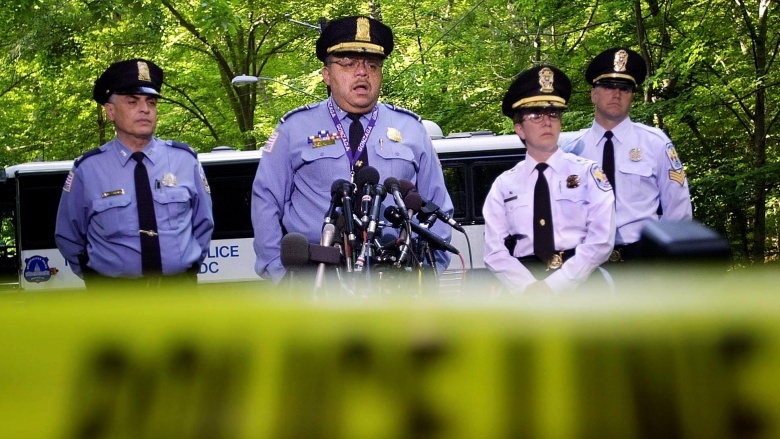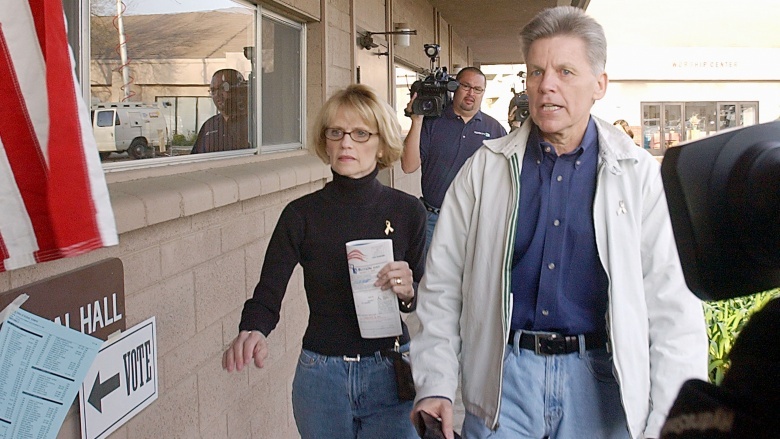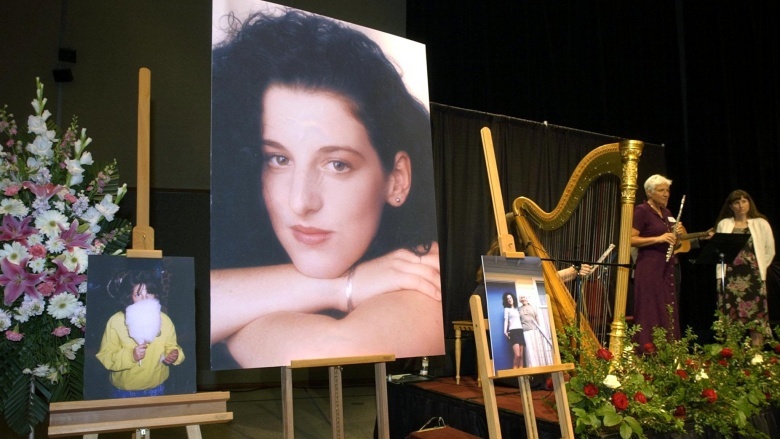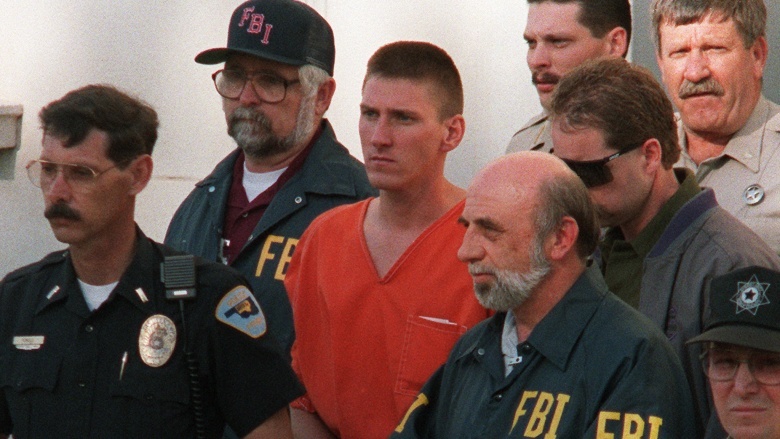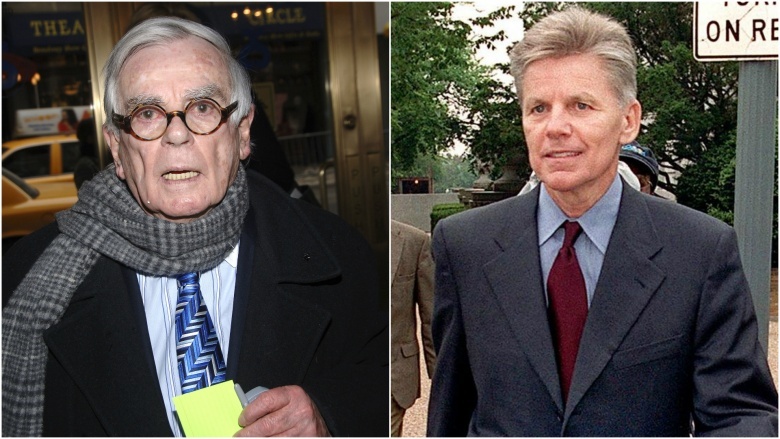Bizarre Things About The Chandra Levy Case
The Chandra Levy case remains one of the biggest murder mysteries in Washington D.C. history. Levy was a promising government intern with connections to a high-powered, married congressman. The 24-year-old disappeared, without a trace on May 1, 2001, after apparently going for a walk or jog. Her remains were discovered a year later in D.C.'s massive Rock Creek Park. In a case chock full of twists and turns, missed opportunities, bizarre evidence, illicit affairs, jailhouse informants, and exonerated suspects, the question remains: who killed Levy? Let's take a closer look at this cold case's most bizarre details.
Botched police work
D.C. cops? More like Keystone Cops. Police reportedly made a slew of critical mistakes while investigating Levy's disappearance and death. For starters, there were security cameras outside Levy's apartment that could have shown when she left her home, if she was alone or with someone else, and if anyone came into her apartment, reported The Washington Post, but that footage was recorded over every seven days. Levy's father in California contacted D.C. police about his missing daughter five days after her disappearance, but by the time cops thought to check the security footage, it was gone.
Also, when trying to access Levy's computer for clues, an untrained police officer inadvertently corrupted her search history. According to The Washington Post, "the mistake would set the investigation back because it would take technicians a month to produce an accurate list of the last Web sites Chandra visited." Even after gaining access to her online searches, authorities reportedly misread the information. They noticed an initial search for "Klingle Mansion," located within Rock Creek Park and went looking for signs of a meeting there, overlooking Levy's subsequent clicks on hiking trails in the park.
"Some three months after her disappearance...the police finally organized a team of police cadets to systematically search the park. Well, sort of," reported The Huffington Post. The cadets were reportedly directed on the scene to search only within 100 yards of the roads crossing the park, though instructions from headquarters had intended the search parameters to be within 100 yards of the trails in the park. "Ten months later, more than a year after the killing, Chandra's body was found lying within a hundred yards of one of these trails, surrounded by articles of clothing," reported The Huffington Post. "But, by then, the forensic evidence that could have identified the killer was gone."
A disgraced politician
Gary Condit, the California congressman with whom Levy was having an affair, quickly became the focal point of the investigation. For months, Condit would not admit he and Levy were seeing each other romantically, but he did coyly tell police (via The Washington Post) that she "occasionally spent the night at his apartment."
The story of Condit's whereabouts on the day Levy disappeared has some holes. According to Newsweek, then Vice-President Dick Cheney claimed Condit was with him on the afternoon of Levy's disappearance. That evening, Condit supposedly met with ABC reporter Rebecca Cooper at a restaurant called Tryst. However, according to Salon, Cooper claimed that meeting took place the day after Levy's disappearance, which means Condit's whereabouts were allegedly unaccounted for during part of the day Levy vanished.
It's also worth noting the congressman was certainly acting shady as the Levy investigation unfolded. Case in point: the "watch box" incident. According to The Washington Post, Condit and a top aide drove from the congressman's residence to a garbage can near a McDonald's in Alexandria, Va. to dispose of an empty Tag Heuer watch box. Someone who recognized Condit called police after watching the lawmaker toss the curious item. "At the time, detectives were puzzled. They tried to eliminate Condit as a suspect, but he was making it difficult," reported the paper. "Why did he keep a watch box for nearly seven years? And why did he throw it out hours before their search of his apartment? They believed that the congressman, at the very least, was obstructing the investigation."
According to the Post, the box had once contained a watch that Joleen Argentini McKay, a member of Condit's congressional staff in the mid-'90s, had given to him. McKay told detectives she'd had a three-year affair with the Congressman. She referred to him as "manipulative and controlling," reported the Post. "She was concerned about Chandra." Condit reportedly refused to take a lie detector test administered by investigators.
Though Condit continued to dodge allegations that he'd had an affair with Levy, court documents indicated his sperm were found on her underwear, and Levy's aunt, Linda Zamsky, revealed that her niece had confided in her about a romance with the congressman. With pressure mounting, Condit finally came clean about his dirty deeds. Court documents also mentioned other women who were sexually involved with the lawmaker, and he allegedly had a "penchant for rough bondage sex," reported the New York Daily News.
The congressman was never charged with any crimes in connection with the Levy case, but the scandal tanked his political career. According to People, he lost his bid for re-election, moved to Arizona with his family, and unsuccessfully ran a Baskin Robbins. In 2016, he contributed to a book about the case titled Actual Malice: A True Crime Political Thriller.
The lipstick
One of the more bizarre hypotheses floating around about this case is the one implying Condit's wife, Carolyn, could have knocked off Levy. While this may sound like the stuff of soap operas, theorists note that Carolyn, who resided in California, flew into town the day before Levy disappeared.
Michael Zeldin, a former independent counsel on the case, told Larry King Live that "the purported reason that [Carolyn] came to town was the congressional wives' luncheon, which was previously scheduled...We know that she came to town a couple times a year, and that this was not inconsistent with that. Whether she had anything to do with this, no one knows."
There's another reason some suspect the congressman's wife was involved: a mysterious tube of lipstick was found near Levy's remains. How likely is it that a woman going out for a walk or a jog in active wear with a key and a portable radio (not even an ID or phone) would bring lipstick along? Conspiracy theorists suggest Condit's wife may have planned to meet with Levy to discuss the affair with her husband, but things went awry.
Carolyn has never been implicated in anything pertaining to Levy's death, so the mystery remains: how did the rogue tube of lipstick make its way to the scene?
A 'murderer' set free
Congressman Condit was under intense scrutiny for months, but the spotlight shifted after two major events. First, the terrorist attacks of Sept. 11, 2001 redirected the nation's attention, and the FBI's resources, away from the Levy case. By the time press coverage about Levy resumed, there was a new creep on the radar by the name of Ingmar Guandique.
Guandique, an illegal immigrant from El Salvador, was convicted of attacking female joggers on May 14, 2001 and July 1, 2001, in Rock Creek Park, not far from where Levy's body was found. According to The Washington Post, the victims said Guandique snuck up on them, pulled a knife, and tried to make off with their belongings. When a jailhouse informant identified Guandique as a suspect in the Levy case in September 2001, the initial theory was that Condit hired Guandique to kill Levy, but that story mutated to Guandique allegedly killing Levy in the park during a botched robbery attempt.
Guandique was found guilty of Levy's murder in 2010, but that conviction was overturned in 2015 when news broke that the informant had allegedly lied under oath, upending the case. Federal prosecutors decided not to proceed with a new trial in 2016 and moved to have Guandique deported.
A jailhouse snitch
Convicted and vindicated murderer Guandique was no angel. He had a history of violence, especially against women. His girlfriend, Iris Portillo testified that he'd abused her, yet even she expressed doubts that he would have killed Levy. Portillo told The Washington Post (via SF Gate), "He hit me a lot, and I was scared of him. But I don't believe he killed anyone."
One of his jailhouse cellmates sang a different tune. According to The Washington Post, Armando Morales testified that Guandique told him, "Homeboy, I killed that b**ch, but I didn't rape her."
Even though a third cellmate claimed he never heard that kind of talk from Guandique, Morales' snitching proved enough to convict, despite a lack of DNA evidence, witnesses, or a confession from Guandique. The fingered felon even passed a lie detector test.
Morales asked to be put into the witness protection program in exchange for his testimony, but a few years later, his story unraveled.
The actress
Could an aspiring actress take down the entire prosecution's case?
The answer is yes. A woman named Babs Proller, who once worked as an extra in the political drama House of Cards, recorded audio that ultimately led to Guandique's exoneration. After meeting Morales in her Maryland neighborhood, she befriended him, then began to record their conversations, reported Inside Edition. According to Proller, Morales told her about the Levy case and admitted he lied during the trial, but according to The Washington Post, during Proller's seven hours worth of recordings, Morales says nothing about lying on the witness stand and nothing about the Levy case. Even so, there was reportedly enough unseemly material in the audio to undermine the credibility of the prosecution's star witness and prompt the court to drop all charges against Guandique in connection with Levy.
"The guy said he was now reformed, one of Christ's apostles," said Bernard S. Grimm, a Washington defense lawyer who spoke with The Washington Post about Morales. "But if you listen to him on that tape, he's still the same gang thug he was years ago. It comes down to general credibility."
Some have questioned Proller's past. She has theft and fraud charges on her record, but at the time of this writing, attempts to discredit the informant who discredited the informant have not stuck.
A missing ring
Levy reportedly left her DuPont Circle apartment on May 1, 2001 with nothing but a set of keys, her portable radio, and headphones. She left behind her cell phone, wallet, ID, and many other things a person might bring with them if they were doing something other than walking or jogging.
According to ABC News, when police searched her apartment, the only two things missing were Levy's keys and a ring. The latter was a gold pinkie ring engraved with her initials and given to her by her parents, according to The Modesto Bee.
Was the ring snatched from Levy as part of a robbery, collected as a trophy by the killer, or removed to keep authorities from identifying the body? Investigators searched pawn shops in the area hoping for answers but found nothing. Years later, some still hold out hope that if the ring is located, it will lead to the killer.
Eminem namechecked her
The Levy case dominated the news for years. Not only was it a horrific crime, but it had all the ingredients of a thriller: mystery, sex, Washington insiders, and scandal. The real-life case read like an episode of House of Cards mixed with Scandal. Levy became such a household name that rapper Eminem even mentions her in the "Business" off his album The Eminem Show.
Did Levy know FBI secrets?
Levy had been interning with the Federal Bureau of Prisons since October 2000. According to People, during the course of her paid internship she worked in the public affairs division and was "heavily involved in assisting the media in the months leading up to the execution of Timothy McVeigh," the man convicted of bombing the Oklahoma City Federal Building.
In his book, Actual Malice, Condit hints that Levy may have known too much about the McVeigh case, fueling conspiracy theories that the government could have had a hand in Levy's demise. According to the Daily Mail, Condit claims in the book that Levy visited him a couple weeks before her death and "shared explosive information with him" about McVeigh.
Was Levy murdered for knowing too much FBI dirt, or was Condit merely attempting to deflect attention and sell copies of his book?
An Arab sex ring?
Yes, you heard right. As if this case wasn't weird enough, a story about a sex ring became tangled up with the murder investigation. Vanity Fair's Dominick Dunne investigated a tip claiming Condit ordered a hit on Levy to be carried out by a group of Arab friends who ran a sex ring. According to the Los Angeles Times, Dunne shared information about his research on The Laura Ingraham Show and at a dinner party with author Gore Vidal and actress Angelica Huston.
Condit slapped Dunne with an $11 million lawsuit, claiming the journalist "made false and defamatory statements, accusing [Condit] of involvement in the crimes of kidnapping and murder." A judge nixed the suit, calling it "frivolous."
The real mystery here may be how to get an invite to a dinner party with Vidal and Huston.
Is there a serial killer on the loose?
It's been suggested by profilers, detectives, and Condit himself that Levy fell prey to a serial killer. Condit mentioned this theory to the Merced Sun-Star (via The Washington Post), adding "We ought to hold someone accountable for the crime rate in Washington, D.C., for the unsolved homicides and the unsolved missing persons."
The notion of a serial killer might not be too far-fetched. On Jan. 24, 2001, Albert W. Cook reportedly killed 48-year-old jogger Sue Wen Stottmeister in Rock Creek Park.
A year before Levy's disappearance, 28-year-old Joyce Chiang, who worked for the congressman whose office was next to Condit's and frequented the same coffee shop as Levy, went missing. Her remains washed up four months later on the banks of the Potomac River. According to the Washington Examiner, Chiang fell prey to robbers, but John Walsh of America's Most Wanted claimed the killers were "serial rapists."
Five months before Chiang disappeared, another young professional named Christine Mirzayan vanished on the way home from dinner and was found sexually assaulted and murdered the next day. The 29-year-old had relocated to D.C. for a fellowship at the National Academy of Sciences. Her case remains unsolved, although her death has been linked to the unknown Potomac River Rapist, who is still thought to be at large.
Where's Dexter when you need him?


